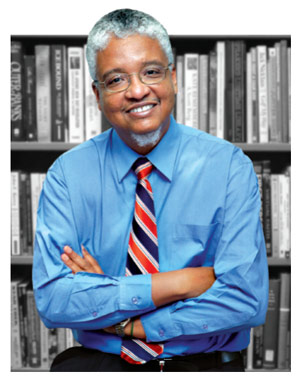![]()
![]()

The Council has also established itself globally through recognition of the CSEC and CAPE examinations for entry into universities external to the region, particularly in the United States, Canada and the United Kingdom. It is also recognised as a global leader in continuous assessment and in 2014, the Council received a delegation from the Examinations Council of Lesotho, who were interested in the Council’s assessment methodologies. Lesotho is not the first African country to be interested in CXC’s work, as delegations from Botswana and Zambia have also visited. Strategic Planning has been institutionalised at the CXC and I am pleased that each iteration has built on the solid accomplishments of the previous Plan. I am hopeful that the Council will continue to use this approach to guide its ever upward trajectory in the future. In 2014, we bade farewell to Registrar, Dr. Didacus Jules who left to take up the post of Director-General of the Organisation of Eastern Caribbean States in May. During his tenure, the CXC made quantum leaps. Dr. Jules is a visionary leader who challenged the status quo and also challenged all CXC stakeholders to think outside the proverbial box. He inspired the team at CXC as well as Council Members to share his vision for the CXC and I believe that the reputation of the Council has benefitted tremendously from the work that he has done as Registrar. I am sure that the entire CXC community joins me in wishing him the very best as he goes on to his new position. To the incoming Registrar, I say hearty congratulations and wish him the very best for a successful tenure! Since assuming the Chairmanship of CXC, it has been with much pride that I have prepared the introduction to the Annual Report. The Reports collectively capture the journey of the Council, consistently improved through the dedication and commitment of many team members since (and before) 1973. To the current team, to past Registrars and Pro-Registrars, the many markers throughout the years, the subject panels, and so many others who have shared this journey, I pay tribute. It is their story that these Reports have told. This one is particularly poignant for me as this is also my last year as Chairman of CXC. It has been an honour and a pleasure to have worked with two Registrars and a Pro-Registrar who have been stellar achievers. To the teams at Headquarters and at Western Zone, I say a special thank you for all that you do to make this regional institution the marvellous, organic entity that it is and will continue to be in the foreseeable future! Professor E. Nigel Harris |



 The Annual Report of the Caribbean Examinations Council has, throughout the years, chronicled the growth of a remarkable institution that has as its core business, the preparation and marking of examinations that serve as a quality assessment mechanism for students leaving the secondary system and entering either the tertiary education system or the world of work. The development of examinations that are relevant to the Caribbean was, in the 1970s when the Council was established, a symbol of a region on the move towards self-actualisation. Forty years later, I think we can look back with great satisfaction and say that the Council has matured, has evolved from just providing and marking examinations to providing business and consulting services and expanding its certification modalities. During my own tenure as Chairman, it has been very satisfying to watch the Council move from strength to strength. The expansion of subject offerings has been of particular pride and in 2014, the Council launched what are being referred to as “New Generation” CAPE subjects with significant stakeholder support. Technology has been infused into every aspect of the Council’s operations including the Registrar’s blog, information has been made ever more accessible on-line at the Council’s website, and for the first time in 2014 there was e-marking of 11 papers in 7 subject areas.
The Annual Report of the Caribbean Examinations Council has, throughout the years, chronicled the growth of a remarkable institution that has as its core business, the preparation and marking of examinations that serve as a quality assessment mechanism for students leaving the secondary system and entering either the tertiary education system or the world of work. The development of examinations that are relevant to the Caribbean was, in the 1970s when the Council was established, a symbol of a region on the move towards self-actualisation. Forty years later, I think we can look back with great satisfaction and say that the Council has matured, has evolved from just providing and marking examinations to providing business and consulting services and expanding its certification modalities. During my own tenure as Chairman, it has been very satisfying to watch the Council move from strength to strength. The expansion of subject offerings has been of particular pride and in 2014, the Council launched what are being referred to as “New Generation” CAPE subjects with significant stakeholder support. Technology has been infused into every aspect of the Council’s operations including the Registrar’s blog, information has been made ever more accessible on-line at the Council’s website, and for the first time in 2014 there was e-marking of 11 papers in 7 subject areas.